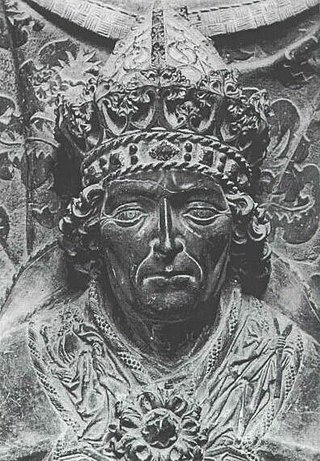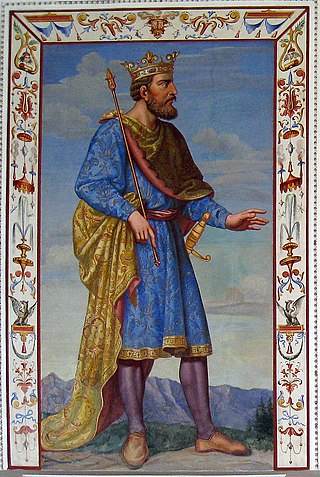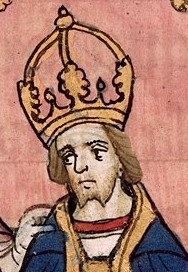
Louis IV, called the Bavarian, was King of the Romans from 1314, King of Italy from 1327, and Holy Roman Emperor from 1328 until his death in 1347.

The Holy Roman Emperor, originally and officially the Emperor of the Romans during the Middle Ages, and also known as the Romano-German Emperor since the early modern period, was the ruler and head of state of the Holy Roman Empire. The title was held in conjunction with the title of King of Italy from the 8th to the 16th century, and, almost without interruption, with the title of King of Germany throughout the 12th to 18th centuries.

Adolf was the count of Nassau from about 1276 and the elected king of Germany from 1292 until his deposition by the prince-electors in 1298. He was never crowned by the pope, which would have secured him the imperial title. He was the first physically and mentally healthy ruler of the Holy Roman Empire ever to be deposed without a papal excommunication. Adolf died shortly afterwards in the Battle of Göllheim fighting against his successor Albert of Habsburg.

Conrad, a member of the Hohenstaufen dynasty, was the only son of Emperor Frederick II from his second marriage with Queen Isabella II of Jerusalem. He inherited the title of King of Jerusalem upon the death of his mother in childbed. Appointed Duke of Swabia in 1235, his father had him elected King of Germany and crowned King of Italy in 1237. After the emperor was deposed and died in 1250, he ruled as King of Sicily until his death.

Henry of Gorizia, a member of the House of Gorizia, was Duke of Carinthia and Landgrave of Carniola and Count of Tyrol from 1295 until his death, as well as King of Bohemia, Margrave of Moravia and titular King of Poland in 1306 and again from 1307 until 1310. After his death, the Habsburgs took over Carinthia and Carniola and held them almost without interruption until 1918.

Frederick the Fair or the Handsome, from the House of Habsburg, was the duke of Austria and Styria from 1308 as well as the anti-king of Germany from 1314 until 1325 and then co-king until his death.
The imperial ban was a form of outlawry in the Holy Roman Empire. At different times, it could be declared by the Holy Roman Emperor, by the Imperial Diet, or by courts like the League of the Holy Court (Vehmgericht) or the Reichskammergericht.

Rudolf I of Bavaria, called "the Stammerer", a member of the Wittelsbach dynasty, was Duke of Upper Bavaria and Count Palatine of the Rhine from 1294 until 1317.

Henry VII, also known as Henry of Luxembourg, was Count of Luxembourg, King of Germany from 1308 and Holy Roman Emperor from 1312. He was the first emperor of the House of Luxembourg. During his brief career he reinvigorated the imperial cause in Italy, which was racked with the partisan struggles between the divided Guelph and Ghibelline factions, and inspired the praise of Dino Compagni and Dante Alighieri. He was the first emperor since the death of Frederick II in 1250, ending the Great Interregnum of the Holy Roman Empire; however, his premature death threatened to undo his life's work. His son, John of Bohemia, failed to be elected as his successor, and there was briefly another anti-king, Frederick the Fair, contesting the rule of Louis IV.

Rudolf I, a member of the House of Ascania, was Duke of Saxe-Wittenberg from 1298 until his death. By the Golden Bull of 1356 he was acknowledged as Elector of Saxony.
The imperial election of 22 May 1400 was an imperial election held to select the emperor of the Holy Roman Empire. It took place in Frankfurt.
In the years 1410 and 1411 saw three royal elections in the Holy Roman Empire. The elections were prompted by the death of previous King Rupert in 1410 and, after two contested elections in 1410, resulted in Sigismund of Hungary being recognized as the new king in 1411.

The imperial election of 1440 was an imperial election held to select the emperor of the Holy Roman Empire. It took place in Frankfurt on February 2.

The imperial election of 1612 was an imperial election held to select the emperor of the Holy Roman Empire. It took place in Frankfurt on 13 June.
The imperial election of 1619 was an imperial election held to select the emperor of the Holy Roman Empire. It took place in Frankfurt on August 28.

The imperial election of 1742 was an imperial election held to select the emperor of the Holy Roman Empire. It took place in Frankfurt on January 24. The result was the election of Charles Albert of Bavaria, the first non-Habsburg emperor in three hundred years.

The imperial election of 1273 was an imperial election held to select the emperor of the Holy Roman Empire. It took place in Frankfurt on October 1.
The imperial election of 1292 was an imperial election held to select the emperor of the Holy Roman Empire. It took place in Frankfurt on May 5. Emperor Rudolf I of Germany had died on 15 July 1291.

The imperial election of 20 October 1314 was an imperial election held to select the emperor of the Holy Roman Empire. It took place in Frankfurt.













